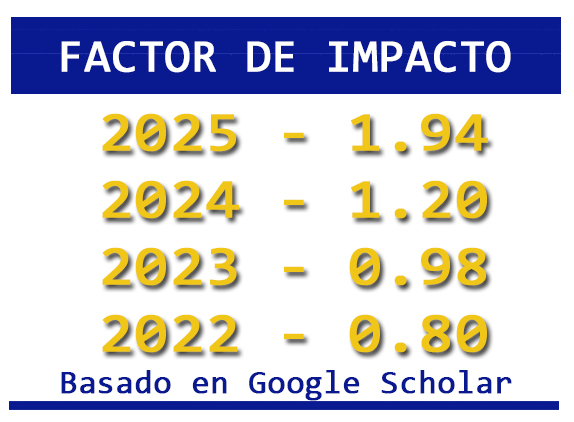PSYCHOSOCIAL RISK ANALYSIS IN A SOFTWARE OUTSOURCING COMPANY DURING COVID-19
DOI:
https://doi.org/10.36790/epistemus.v14i29.157Keywords:
COVID-19, IT, psychosocial risks, work-life balance, teleworkAbstract
This work focuses on discovering the psychosocial risks that exist in the Mexican software industry, specifically a company that works via telework due to COVID-19 lockdowns and to explore where the risks come from, either the working relationship with the company or the relationship with their client. The study is based in the survey offered by the NOM-035-STPS-2018 regulation to diagnose the psychosocial risks in a sample of 183 employees. To achieve this, an exploratory factorial analysis was performed in which the results showed that employees feel positively regarding their company, specifically the leadership received but they observe a negative impact on their work-life balance and extended work hours because of their relationship with their client, this can be exacerbated by the current use of telework in place by the company.
Downloads
References
Akomolafe, O. O. 2018. The Effects of Outsourcing on the Psychological Contract of Survivor Employees : The Case of UK Real Estate Sector. Ph. D. dissertation. London Metropolitan University.
Ananya, B., Priya, V. V. y Gayathri, R. 2019. ‘Stress and health problems among information technology professionals’. Drug Invention Today, 12(7): 1336–1338.
Baert, S., Lippens, L., Moens, E., Sterkens, P. y Weytjens, J. 2020. ‘How Do We Think the COVID-19 Crisis Will Affect Our Careers (If Any Remain)?’. Working Papers of Faculty of Economics and Business Administration, Ghent University, Belgium.
Bharathi, S. V. y Mala, E. P. 2016. ‘A study on the determinants of work–Life balance of women employees in information technology companies in India’. Global Business Review: 665–683.
Butt, R. S., Altaf, S., Chohan, I. M. y Ashraf, S. F. 2019. Analyzing the role of quality of work life and happiness at work on employees job satisfaction with the moderation of job stress, empirical research of jiangsu university. International Journal of Scientific and Technology Research, 8(10): 1905–1915.
Craig, L. y Churchill, B. 2020. ‘Dual-earner parent couples’ work and care during COVID-19’, Gender, Work and Organization, (June): pp. 1–14.
Davitkovski, M., Sarkanjac, S. J. y Sarkanjac, B. 2020. ‘The effects of flexible work in the IT industry’, in 17th International Conference on Informatics and Information Technologies - CIIT 2020. Ss Cyril and Methodius University in Skopje: pp. 0–5.
Dawson, D. L. y Golijani-Moghaddam, N. 2020. ‘COVID-19: Psychological Flexibility, Coping, Mental Health, and Wellbeing in the UK during the pandemic’. Journal of Contextual Behavioral Science. Elsevier Inc., 17(July): 126–134.
Gallardo Gallardo, I., Herran Peñafiel, J. y Carrera Viver, G. 2019. ‘Carga Mental Y Desempeño Laboral En Los Trabajadores De Una Empresa Industrial’. Retos de la Ciencia, 3(1): 26–44.
Gerding, T., Syck, M., Daniel, D., Naylor, J., Kotowski, S. E., Gillespie, G. L., Freeman, A. M., Huston, T. R. y Davis, K. G. 2021. ‘An assessment of ergonomic issues in the home offices of university employees sent home due to the COVID-19 pandemic’. Work, 68: 1–12.
Gordon, S. F. 2020. "El COVID-19 y la salud mental: ¿cuáles son las consecuencias?." Psicología Iberoamericana, Vol. 28, núm.1. [Consultado: 12 de Junio de 2021]. Disponible en: https://www.redalyc.org/articulo.oa?id=133963198003.
Iida, M., Sasaki, N., Kuroda, R., Tsuno, K. y Kawakami, N. 2021. ‘Increased COVID-19-related workplace bullying during its outbreak: a 2-month prospective cohort study of full-time employees in Japan’, Environmental and Occupational Health Practice: 1–11.
Inegbedion, H., Inegbedion, E., Peter, A. y Harry, L. 2020. ‘Perception of workload balance and employee job satisfaction in work organisations’, Heliyon. Elsevier Ltd, 6(1): e03160.
Lipovetsky, S. 2017. ‘Factor analysis by limited scales: Which factors to analyze?’. Journal of Modern Applied Statistical Methods, 16(1): 233–245.
Miranti, R. y Li, J. 2020. ‘Working hours mismatch, job strain and mental health among mature age workers in Australia’, Journal of the Economics of Ageing. Elsevier, 15(November 2019): 100227.
Moore, J. E. 2000. ‘One road to turnover: An examination of work exhaustion in technology professionals’. MIS Quarterly: Management Information Systems, 24(1): 141–168.
Osborne, J., Osborne, J. W., Costello, A. B. y Kellow, J. T. 2011. Best Practices in Exploratory Factor Analysis. Best Practices in Quantitative Methods: 86-99.
Padma, V., Anand, N. N., Gurukul, S. M. G. S., Javid, S. M. A. S. M., Prasad, A. y Arun, S. 2015. ‘Health problems and stress in Information Technology and Business Process Outsourcing employees’. Journal of Pharmacy and Bioallied Sciences, 7(April), pp. S9–S13.
Piotrowski, A., Eldridge, E., Jurek, P. y Olech, M. 2020. ‘Lack of control over work and organizational citizenship behavior: overwork climate as a suppressor variable’. Health Psychology Report: 1–8.
Rodríguez, M. C., Dabos, G. E. y Rivero, A. G. 2018. ‘Implementing work-life balance policies in SMEs: A multiple case study in the software industry’, Estudios Gerenciales, 34(147): 172–189.
STPS, 2018. DOF: 23/10/2018 Norma Oficial Mexicana NOM-035-STPS-2018, Factores de riesgo psicosocial en el trabajo-Identificación, análisis y prevención. Rept. STPS 23/10/2018, Ciudad de México .
Tavakol, M. y Dennick, R. 2011. ‘Making sense of Cronbach’s alpha’. International journal of medical education, 2: 53–55.
Tracy, S. J., Lutgen-sandvik, P. y Alberts, J. K. 2006. ‘Nightmares, Demons, and Slaves: Exploring the Painful Metaphors of Workplace Bullying’. Management Communication Quarterly, 20(2): 148–185.
Varajão, J., Cruz-Cunha, M. M. y Da Glória Fraga, M. 2017. ‘IT/IS Outsourcing in Large Companies - Motivations and Risks’, Procedia Computer Science. Elsevier B.V., 121: 1047–1061.
WHO. 2020. WHO announces COVID-19 outbreak a pandemic (12th March 2020). [Consultado el 13 de marzo de 2021] Disponible en: http://www.euro.who.int/en/health-topics/health-emergencies/coronavirus-covid-19/news/news/2020/3/who-announces-covid-19-outbreak-a-pandemic.
Downloads
Published
How to Cite
Issue
Section
License
Copyright (c) 2021 EPISTEMUS

This work is licensed under a Creative Commons Attribution-NonCommercial-NoDerivatives 4.0 International License.
The magazine acquires the patrimonial rights of the articles only for diffusion without any purpose of profit, without diminishing the own rights of authorship.
The authors are the legitimate owners of the intellectual property rights of their respective articles, and in such quality, by sending their texts they express their desire to collaborate with the Epistemus Magazine, published biannually by the University of Sonora.
Therefore, freely, voluntarily and free of charge, once accepted the article for publication, they give their rights to the University of Sonora for the University of Sonora to edit, publish, distribute and make available through intranets, Internet or CD said work, without any limitation of form or time, as long as it is non-profit and with the express obligation to respect and mention the credit that corresponds to the authors in any use that is made of it.
It is understood that this authorization is not an assignment or transmission of any of your economic rights in favor of the said institution. The University of Sonora guarantees the right to reproduce the contribution by any means in which you are the author, subject to the credit being granted corresponding to the original publication of the contribution in Epistemus.
Unless otherwise indicated, all the contents of the electronic edition are distributed under a license for use and Creative Commons — Attribution-NonCommercial-ShareAlike 4.0 International — (CC BY-NC-SA 4.0) You can consult here the informative version and the legal text of the license. This circumstance must be expressly stated in this way when necessary.
The names and email addresses entered in this journal will be used exclusively for the purposes established in it and will not be provided to third parties or for their use for other purposes.















